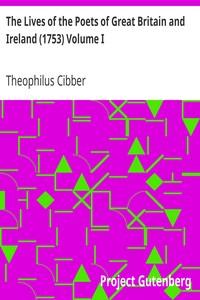|
|
Read this ebook for free! No credit card needed, absolutely nothing to pay.Words: 102641 in 29 pages
This is an ebook sharing website. You can read the uploaded ebooks for free here. No credit cards needed, nothing to pay. If you want to own a digital copy of the ebook, or want to read offline with your favorite ebook-reader, then you can choose to buy and download the ebook.

: The Lives of the Poets of Great Britain and Ireland (1753) Volume I. by Cibber Theophilus - Poets English Biography Early works to 1800; Poets Irish Biography Early works to 1800 Biographies@FreeBooksTue 06 Jun, 2023 Lordings! quoth he, in chirch when I preche, I paine mee to have an have an hauteine speche; And ring it out, as round as doth a bell; For I can all by rote that I tell. My teme is always one, and ever was, First, I pronounce fro whence I come, And then my bills, I shew all and some: Our liege--lords seal on my patent! That shew I first, my body to warrent; That no man be so bold, priest ne clerk, Me to disturb of Christ's holy werke; And after that I tell forth my tales, Of bulls, of popes, and of cardinales, Of patriarkes, and of bishops I shew; And in Latin I speake wordes a few, To faver with my predication, And for to stere men to devotion, Then shew I forth my long, christall stones, Ycrammed full of clouts and of bones; Relickes they been, as were they, echone! Then have I, in Latin a shoder-bone, Which that was of an holy Jewes shepe. Good men, fay, take of my words kepe! If this bone be washen in any well, If cow, or calfe, shepe, or oxe swell That any worm hath eaten, or hem strong, Take water of this well, and wash his tong. And it is hole a-non: And furthermore, Of pockes, and scabs, and every sore Shall shepe be hole, that of this well Drinketh a draught: Take keep of that I tell! If that the good man, that beasts oweth, Woll every day, ere the cocke croweth, Fasting drink of this well, a draught, His beasts and his store shall multiplie: And sirs, also it healeth jealousie, For, though a man be fall in jealous rage, Let make with this Water his potage, And never shall he more his wife mistrist, Thughe, in sooth, the defaut by her wist: All had she taken priests two or three! Here is a mittaine eke, that ye may see. He that has his hand well put in this mittaine; He shall have multiplying of his graine, When he hath sowen, be it wheat or otes; So that he offer good pens or grotes! Those who would prefer the thoughts of this father of English poetry, in a modern dress, are referred to the elegant versions of him, by Dryden, Pope, and others, who have done ample justice to their illustrious predecessor. LANGLAND. It has been disputed amongst the critics whether this poet preceded or followed Chaucer. Mrs. Cooper, author of the Muses Library, is of opinion that he preceded Chaucer, and observes that in more places than one that great poet seems to copy Langland; but I am rather inclined to believe that he was cotemporary with him, which accounts for her observation, and my conjecture is strengthened by the consideration of his stile, which is equally unmusical and obsolete with Chaucer's; and tho' Dryden has told us that Chaucer exceeded those who followed him at 50 or 60 years distance, in point of smoothness, yet with great submission to his judgment, I think there is some alteration even in Skelton and Harding, which will appear to the reader to the best advantage by a quotation. Of Langland's family we have no account. Selden in his notes on Draiton's Poly Olbion, quotes him with honour; but he is entirely neglected by Philips and Winstanly, tho' he seems to have been a man of great genius: Besides Chaucer, few poets in that or the subsequent age had more real inspiration or poetical enthusiasm in their compositions. One cannot read the works of this author, or Chaucer, without lamenting the unhappiness of a fluctuating language, that buries in its ruins even genius itself; for like edifices of sand, every breath of time defaces it, and if the form remain, the beauty is lost. The piece from which I shall quote a few lines, is a work of great length and labour, of the allegoric kind; it is animated with a lively and luxurious imagination; pointed with a variety of pungent satire; and dignified with many excellent lessons of morality; but as to the conduct of the whole, it does not appear to be of a piece; every vision seems a distinct rhapsody, and does not carry on either one single action or a series of many; but we ought rather to wonder at its beauties than cavil at its defects; and if the poetical design is broken, the moral is entire, which, is uniformly the advancement of piety, and reformation of the Roman clergy. The piece before us is entitled the Vision of Piers the Plowman, and I shall quote that particular part which seems to have furnished a hint to Milton in his Paradise Lost, b. 2. 1. 475. Numbers of all diseased: all maladies Of ghastly spasm, or racking torture, qualms Of heartsick agony, all fev'rous kinds, Convulsions, epilepsies, fierce catarrhs, Intestine stone and ulcer, cholic-pangs Demoniac phrenzy, moping melancholy And moon-struck madness, pining atrophy, Marasmus, and wide-wasting pestilence, Dropsies and asthmas, and joint-racking rheums; Dire was the tossing! deep the groans! despair Tended the sick, busiest from couch to couch: And over them, triumphant death his dart Shook. P. L. b. xi. 1. 477. Sir JOHN GOWER En toy quies fitz de Dieu le pere, Sauve soit, qui gist fours cest pierre. The second writing MERCY, with this device; O bene Jesu fait ta mercy, A'lame, dont la corps gisticy. The third writing PITY, with this decree; Pour ta pitie Jesu regarde, Et met cest a me, en sauve garde. Free books android app tbrJar TBR JAR Read Free books online gutenberg More posts by @FreeBooks
: Punch or the London Charivari Volume 153 September 12 1917 by Various - English wit and humor Periodicals Punch@FreeBooksTue 06 Jun, 2023

: Great Possessions by Grayson David - Authors American 20th century Biography; Grayson David 1870-1946 Homes and haunts Massachusetts Amherst Region; Country life Massachusetts Amherst Region; Massachusetts Intellectual life 20th century; Amherst Region (Ma@FreeBooksTue 06 Jun, 2023

: Lost in the Air by Snell Roy J Roy Judson - Arctic regions Juvenile fiction; Air pilots Juvenile fiction; Airplanes Piloting Juvenile fiction@FreeBooksTue 06 Jun, 2023
|
Terms of Use Stock Market News! © gutenberg.org.in2025 All Rights reserved.






